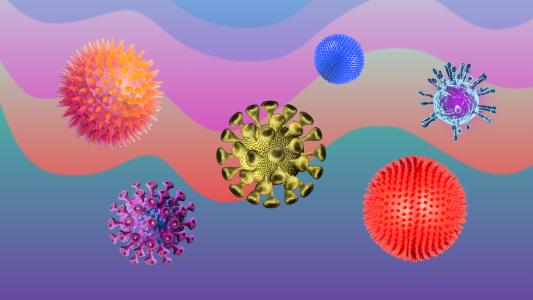An in-development COVID-19 nasal vaccine that contains a live but weakened coronavirus outperformed several other types of shots in a preclinical study — suggesting that there may be a less painful and more effective way to protect against COVID-19.
The challenge: More than 30 COVID-19 vaccines have been authorized for use in at least one country, and while they’re all designed to help the immune system recognize the coronavirus so that it can stop an infection, they do so in a variety of ways.
The mRNA vaccines, for example, deliver instructions that teach our cells to make the coronavirus’ spike protein, and protein-based shots just inject the spike directly. Adenovirus vaccines use the shells of a cold virus as carriers for the spike instructions, while inactivated vaccines use whole, killed coronaviruses.
Live attenuated vaccines are typically highly effective, durable, and can be stored in refrigerators.
In search of: One thing missing from our COVID-19 vaccine arsenal is a live attenuated vaccine, which uses a live but weakened version of the virus to train the immune system to fight the real thing.
These vaccines aren’t without limitations — because it is possible that the attenuated virus might retain its toxicity in the body, they might not be the best option for people who are immunocompromised.
However, they’re typically highly effective, durable, and can be stored in refrigerators, which makes them easier to distribute than shots that must be frozen. They’re also well understood, as we use them to protect against flu, smallpox, measles, and many other diseases.
What’s new? Several groups are now working to get a live attenuated vaccine for COVID-19 authorized, and a team in Germany has just published positive preclinical data on their candidate, sCPD9, which is delivered via a nasal spray, rather than an injection.
“Overall protection from virus replication, tissue damage, and lung inflammation were significantly better.”
Nouailles et al.
This approach creates what’s known as “local immunity” in the mucus membranes of the nose and mouth, which can prevent the coronavirus from entering the body at all. With injected vaccines, the immune system typically doesn’t spring into action until the coronavirus is in the body, and a person might have already spread the virus to others by then.
Nasal vaccines also have the benefit of being less painful (and, for some, less scary) than injections, which could encourage more people to get vaccinated.
How it works: For their study, the German researchers used hamsters to compare their live attenuated vaccine against BNT162b2, an approved mRNA vaccine developed by BioNTech and Pfizer, and Ad2-Spike, an in-developed adenovirus-based vaccine.
The hamsters were given two doses of vaccine 21 days apart — these were either two doses of the live attenuated vaccine, two doses of the mRNA vaccine, two doses of the adenovirus-based vaccine, or the mRNA vaccine followed by the live attenuated vaccine.
“Our goal is to rapidly scale-up production and advance clinical development.”
Vladimir Cmiljanovic
Fourteen days after the second dose, the hamsters were challenged with the coronavirus. The researchers then looked at tissue samples from the animal’s nasal passages and lungs, and discovered that the live attenuated vaccine out performed the others at protecting against infection.
“Overall protection from virus replication, tissue damage, and lung inflammation were significantly better in sCPD9-vaccinated animals,” they wrote.
Looking ahead: A handful of live attenuated vaccines for COVID-19 have made it to human testing — NY-based biotech startup Codagenix’s candidate is in phase 3 trials — and the German researchers hope theirs will be the next to take that major step closer to authorization.
To that end, they’ve teamed up with Swiss startup RocketVax AG to prepare their vaccine for phase 1 clinical trials.
“Our goal is to rapidly scale-up production and advance clinical development towards market access to provide protection against post-COVID symptoms for all,” said RocketVax CEO Vladimir Cmiljanovic.
We’d love to hear from you! If you have a comment about this article or if you have a tip for a future Freethink story, please email us at [email protected].






